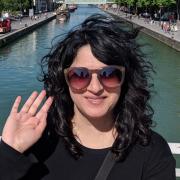We invite you to join the Philadelphia edition of the global World Information Architecture (IA) Day on Saturday, February 17th, 2018. Yes, ours is a week earlier than many others so we could deliver the best experience possible.
World IA Day is a one-day annual celebration that inspires the global growth of Information Architecture as a community of practice. It is held in 25 countries across 5 continent and has been hosted by the Information Architecture Institute since 2012.
Our day-long event features a diverse group of local speakers who will share their thoughts, ideas, and work within an open and welcoming environment with the common goal of practicing, learning, teaching, and shaping the future of IA.
Venue, parking and transit
University of the Sciences McNeil Science and Technology Center (McNeil STC)
4316 Woodland Avenue Philadelphia, Pennsylvania 19026
University of the Sciences can be reached via public transportation by taking the green line trolley #11 or #36 to Woodland Avenue.
View driving directions with campus map. Visitor parking is free and is located in front of or behind the Athletic/Recreation Center (#4 on campus map). The McNeil Science and Technology Center is located next to the Athletic/Recreation Center (#20 on campus map).
Program/Schedule
Registration and Breakfast
Opening Remarks
"The Content Strategy Of Civil Discourse"
Presented by David Dylan Thomas
The IA suggestions presented in this session share the goal of improving the quality of online discourse and building platforms that optimize for collaborating on solutions rather than just trying to see who's right.
Break
"Design In Public Service Journalism"
Presented by Clarisa Diaz
This talk relates to the IA for Good because it explains work done to help people better understand information they receive from each other and official sources, that’s specific to where they live.
Break
"Curse Of Knowledge: Human And Digital Information Overload"
Presented by Lindsay Grow
The "Curse of Knowledge." This is when an expert knows too much about a product and makes assumptions about what others know, which can lead to a mangled experience. The digital version of this is when a system makes automated assumptions of the end user's goal.
This information overload is both a blessing and a curse. The more teams/systems involved the bigger the mess, but the more thorough the information becomes. As information architects, we need to create an understandable version of that mess and present the users with simplified, non-presumptuous information upon which to act.
Lunch
"UX Diplomacy: How To Keep Yourself And Your Team Moving Forward In Times Of Rapid Change"
Presented by Gerry Gant
UX Diplomacy will give helpful tips on how to inspire a team to not only do their best in times of organizational chaos, but discover new skills and confidence.
Break
"Low Fidelity Prototype = High Fidelity Testing"
Presented by Nidhi Jalwal
Validating IA is a big part developing user friendly digital experiences. This talk will focus on how to rapidly validate IA and have some fun in the process.
Break
"Communities Of Health Consumers: Information Architecture Meets Citizen Science"
Presented by George Demiris
This talk will explore how information architecture can facilitate the safe and reliable sharing of valid information in the context of health and health information seeking. We will discuss examples, challenges and opportunities in having IA as a catalyst for patient and family engagement unleashing the potential of citizen science in the biomedical and health sciences domain.
Break
"An Alphabet Of Accessibility Issues"
Presented by Anne Gibson
All of us will need the web to be accessible, if not today, then someday in the future, and if not permanently, then temporarily. An information architecture that only serves the people who come to us with all of their potential faculties in tact is a flawed architecture that fails to serve our users.








